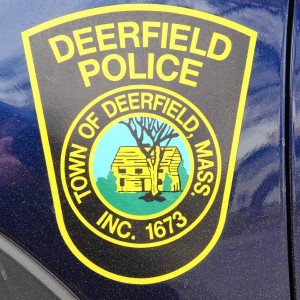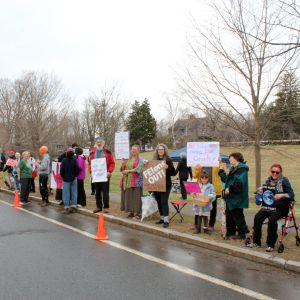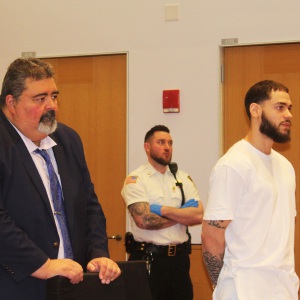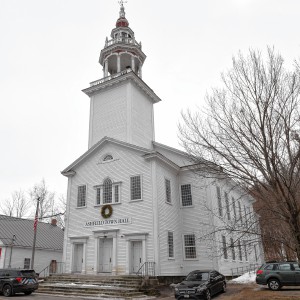Beacon Hill Roll Call: Oct. 28 to Nov. 1, 2024

| Published: 11-08-2024 2:58 PM |
Beacon Hill Roll Call records local representatives’ votes on roll calls from budget vetoes by Gov. Maura Healey. There were no roll calls in the House or Senate last week.
The House 133-25, overrode Gov. Healey’s veto of the entire $2.5 million for a program to treat prisoners suffering from serious mental illness with clinically appropriate injectable medications.
The Senate did not act on the veto so the veto stands and the $2.5 million was eliminated.
“I am vetoing this item due to the availability of alternative resources,” Healey said in her veto message. “This operating funding overlaps with alternative funding intended to support this purpose.”
A “Yes” vote is for the $2.5 million.
Rep. Natalie Blais — Yes
Rep. Aaron Saunders — Yes
Article continues after...
Yesterday's Most Read Articles
 Whately cyclist struck by vehicle in Deerfield
Whately cyclist struck by vehicle in Deerfield
 ‘I can’t picture another job’: Northfield Elementary teacher earns Excellence in Teaching Award
‘I can’t picture another job’: Northfield Elementary teacher earns Excellence in Teaching Award
 Greenfield Police Logs: March 25 to April 6, 2025
Greenfield Police Logs: March 25 to April 6, 2025
 ‘Acres of Clams’ screenings in Greenfield, Belchertown to showcase nuclear power opposition
‘Acres of Clams’ screenings in Greenfield, Belchertown to showcase nuclear power opposition
 Local protests against Trump administration continue as part of 50501 movement
Local protests against Trump administration continue as part of 50501 movement
 Two men sentenced in case of 2023 stabbing in Orange, pursuit
Two men sentenced in case of 2023 stabbing in Orange, pursuit
Rep. Susannah Whipps — Yes
The House, 134-24, overrode Gov. Healey’s veto of $750,000 (reducing funding from $1 million to $250,000) for the Transformative Development Fund, which is designed to accelerate economic development in focused districts that are walkable and have dense environments; and that have the potential to attract investment, inspire a wave of growth, and transform Gateway Cities and beyond.
The Senate did not act on the veto so the veto stands and the $750,000 was eliminated.
“I am reducing this item to an amount consistent with my [budget] recommendation due to the availability of alternative resources,” Healey said in her veto message. “MassHousing will maximize available alternative capital funding in the fiscal year 2025 Capital Investment Plan for the Neighborhood Hub Program that will serve the same purpose as the funding being vetoed.”
A “Yes” vote is for the $750,000.
Rep. Natalie Blais — Yes
Rep. Aaron Saunders — Yes
Rep. Susannah Whipps — Yes
The House, 156-2, overrode Gov. Healey’s veto of $300,000 (reducing funding from $2 million to $1.7 million) for the Massachusetts Manufacturing Extension Partnership to maintain and promote manufacturing as an integral part of the economy, and for programs designed to assist small and mid-size manufacturing companies.
The Senate did not act on the veto so the veto stands and the $300,000 was eliminated.
“I am reducing this item to an amount consistent with my [budget] recommendation,” Healey said in her veto message.
A “Yes” vote is for the $300,000.
Rep. Natalie Blais — Yes
Rep. Aaron Saunders — Yes
Rep. Susannah Whipps — Yes
The Senate approved and sent to the House a bill that would require health insurance companies to provide coverage for diagnostic examinations for breast cancer, digital breast tomosynthesis screenings, and medically necessary and appropriate screenings with breast magnetic resonance imaging.
Supporters noted that although access to routine preventive screening mammograms is covered under the Affordable Care Act, this legislation would go further and require coverage for certain screenings and exams currently not uniformly covered by law.
“I am grateful to see this legislation, which I have worked on for nearly a decade, move forward,” said sponsor Sen. Joan Lovely, D-Salem. “Early detection of breast cancer saves lives. This legislation makes those diagnostic exams used for early detection accessible and affordable, giving women the vital resources needed to catch breast cancer in its earliest stages. With this bill we are bolstering the commonwealth’s commitment to providing higher quality, more equitable and more accessible health care for women.”
“We know that in the fight against cancer, early detection is absolutely vital for the long-term success of the patients,” said Sen. Michael Rush, D-Boston. “We also know that for one out of every 10 women, initial mammogram screenings are not sufficient to detect possible indicators of breast cancer. This legislation passed by the Senate … ensures that all women in the commonwealth have access to the digital breast tomosynthesis and MRI screening they need to catch cancer early without facing financial barriers.”
The Senate approved and sent to the House legislation that would require health insurance companies to provide coverage for the treatment of Down syndrome through speech therapy, occupational therapy, physical therapy and applied behavior analysis services.
“Every child deserves a fair shot at learning, growing and thriving in their community — and that includes children with Down syndrome,” said sponsor Sen. Julian Cyr, D-Provincetown. “Applied Behavioral Analysis (ABA) therapy has proven transformative for so many, yet too often, access to this essential support is out of reach for those who need it most. By ensuring insurance coverage for at-home ABA therapy, this legislation will make a powerful difference for families across the commonwealth, lifting a burden that has existed for too long. It’s about time we make this gold-standard care accessible to all, so every child has the chance to realize their fullest potential.”
An estimated 5,000 people in Massachusetts live with Down syndrome. According to studies performed by the American Speech-Language-Hearing Association, speech therapy intervention improved decoding skills for word reading and had a positive impact on articulation in children with Down syndrome.
The Healey administration announced $24.6 million in grants to 163 Massachusetts food system enterprises to help sustain food production and distribution sectors.
“Our food system is an integral part of our economy, our landscape, our culture and public health,” said Lt. Gov. Kim Driscoll. “These investments will help ensure that farmers, fishers, schools, distributors and other stakeholders can continue to produce food and that all Massachusetts residents rely on.”
“As food producers face growing threats from climate change, the [grant] program helps farmers and fishers build resilience so that they can adapt,” said Massachusetts Executive Office of Energy and Environmental Affairs Secretary Rebecca Tepper. “From changing weather patterns to new invasive species to worker health concerns, our food producers must constantly innovate to remain sustainable, and we are proud to help them do so.”
“As we learned from the COVID pandemic, food insecurity is a real problem in the commonwealth for too many families,” said Senate Ways and Means Committee Chair Sen. Mike Rodrigues, D-Westport. “I have made addressing this disparity a priority and have worked closely with the Healey-Driscoll administration to help grow and sustain food production for our farming communities in the state.”
Gov. Healey announced the awarding of federal funds to 56 nonprofits that are at heightened risk of an extremist attack in Massachusetts.
“These faith-based and community nonprofits play such a critical role in our communities, and we are proud to deliver this funding that will help them implement security measures to keep their residents safe and ensure peace of mind,” Healey said. “We’re grateful to the Biden-Harris administration for making this funding available to ensure these organizations can continue to serve those who depend on them, without fear or interruption.”
“Protecting our communities means safeguarding the organizations that uplift, support and inspire us daily,” said Public Safety and Security Secretary Terrence Reidy. “This funding reaffirms our commitment to protecting these essential community spaces, ensuring they remain safe havens where people of all backgrounds can gather and feel secure.”






 Annual ArtsNight showcases GCC students’ creative talent
Annual ArtsNight showcases GCC students’ creative talent PHOTOS: Greenfield celebrates Earth Day with parade, festivities
PHOTOS: Greenfield celebrates Earth Day with parade, festivities Ashfield voters to consider debt exclusion for retaining wall fixes, series of advisory questions
Ashfield voters to consider debt exclusion for retaining wall fixes, series of advisory questions
